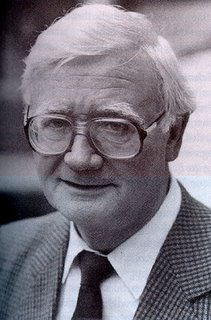
I spent some time this morning reviewing some of my reading notes on Dominican theologian Edward Schillebeeckx. My notes are heavily dependent on a fine and extensive article by Society of the Precious Blood Fr. Robert J. Schreiter, formerly a student of Fr. Schillebeeckx and professor at Catholic Theological Union, Chicago. The article on which I rely was published in The Modern Theologians, edited by David F. Ford.
A good schema to employ up-front with Schillebeeckx is the three-fold schema of experience, contrast experience, and experience of God. On this account it is in and through experience and contrast experience that we experience God. Or, perhaps: e(xperience)+c(ontrast)e(xperience)=e(xperience of)G(od). Something that occurred to me this morning while considering this three-fold schema was a possible Trinitarian implication. Experience, as the most fundamental element, would relate to God qua God, as explained in the Catechism, which, in turn, takes its cue from Lateran Council IV: "God transcends all creatures. We must therefore continually purify our language of everything in it that is limited, imagebound or imperfect, if we are not to confuse our image of God --'the inexpressible, the incomprehensible, the invisible, the ungraspable'-- with our human representations". Contrast experience, the experiencing of sin, suffering, injustice, etc., would correspond (clunky and possibly misleading term) in some sense to the Son, most especially the Cross and Resurrection. The experience of God brought about by the mediation of the paradox between experience and contrast experience can be seen as the work of the Holy Spirit. Again, all of that is rough, sketchy, and preliminary.
Experience
Human experience is fundamental for Schillebeeckx. This is what enables one to classify him as a post-meta-physical theologian. On his view, human experience is not to be contrasted with divine revelation. Rather, human experience is the vehicle (clunky term I know) through which revelation is communicated. There is nothing earth-shattering about such a conception nowadays, but when Schillebeeckx first started these investigations in the 50s and 60s in dialogue with modern Philosophy he created quite a controversy. Why it would be controversial seems strange as one can see it as an attempt to explain the very basic Thomistic (as a Dominican studying in the 1930s he was deeply immersed in Thomism and would self-identify as a Thomist until his philosophical turn in the 1950s) axiom that grace builds on nature.
Human experience includes more than rationality and language. Hence, revelation is not reducible to just another category of experience (i.e., physical, mental, spiritual). For Schillebeeckx revelation encompasses the full range of human perceptions and activities. Therefore, "all revelation is mediated to us through the channels of our experience." Furthermore, revelation offers a critique of our experience and "ends up" standing in dialectical relationship to it. One fruitful result of locating revelation in human experience, is that revelation becomes more than just words and propositions. Revelatory experiences, while mediated by language, are never exhausted by language or concepts. This is another readily accepted view now, a view championed by Schillebeeckx and others as periti (theological experts) at Vatican Council II, among whom was the young Doktor Professor Joseph Ratzinger, as well as Jesuit Karl Rahner, and accepted by the Council fathers. However, when first suggested it was very revolutionary.
A major influence on Schillebeeckx in his student years was Dominicus De Petter, a Neo-Thomist philosopher with an interest in phenomenology and Kant as something of a proto-phenomenologist. A project of De Petter's picked up by Schillebeeckx and, while never abandoned, furthered in dialogue with modern philosophers like Heidegger, Wittgenstein, and Gadamer, was how to link reality to concepts in light of the Critique of Pure Reason.
I hope by writing that experience is described by Schillebeeckx as mystery, I don't damage his essentially existential standpoint. He uses mystery in the double sense of the Greek mysterion; the unknown and a path to knowledge that transforms the subject who walks it. Schillebeeckx, especially in his later work employs a perspectival approach that holds "every perspective contributes to our understanding, but no human perspective can claim absoluteness."
Contrast Experience
Contrast experience occurs when one comes face-to-face with sin, suffering, and injustice, when one experiences events falling short of the ideal of human life, even as understood from non-Christian perspective.
Experience of God: Mediation of the Paradox of Experienced Reality
The experience of God, which comes by way of e+ce. God is experienced through the mediation of the paradox between experience and contrast experience. This is the Cross. For Schillebeeckx the actus fidei the act of faith is essentially an intuition, but is an intuition that is confirmed through the experience of God which is the mediation, put simply, the-making-sense-of, experience and contrast experience. As all such summaries are this is over-simplified, but for a blog entry, a sincere attempt nonetheless. Besides, I'm still finishing my coffee!!


No comments:
Post a Comment